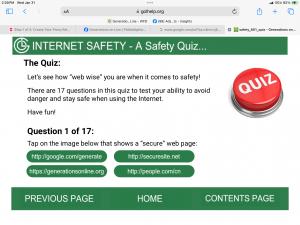Generations on Line releases new self-help training on Safer Internet Day
Tuesday, February 6 is Internet Safety Day. Studies show older adults need practical help. Generations on Line releases new self-help training.
In our 23 years of training older adults, we have witnessed their cautious approach to the Internet and rightly so…. We set out to create a self-help training”
PHILADELPHIA, PA, USA, January 31, 2024 /EINPresswire.com/ -- Tuesday, February 6 is Safer Internet Day, a worldwide event in a year when phishing attacks have become among the most serious types of threat to businesses and the public. On that day Generations on Line (GoL), a national nonprofit dedicated to older adult digital literacy, will release a free interactive self-help safety awareness training tutorial for anyone through www.golhelp.org/internet safety.— Tobey Dichter Founder, CEO
The tutorial guides individuals based on their own predilections and preferences with information, interactive quizzes for the basics, and specific tasks such as shopping, safe surfing, email insights, password protection, and more. It will be used by the wide network of senior centers, libraries and elder residential facilities Generations on Line serves and the more than 300,000 GoL users.
DATA ON PHISHING ATTACKS
Since 2019, the number of phishing attacks has increased by more than 150% yearly, according to Gary Smith, at cyber security Station X. Phishing is the term used when a scammer attempts to steal a user’s sensitive information (such as credit and debit card details, phone numbers and addresses), using fake emails, fake websites, or both.
Phishing attacks rely on human gullibility and are said to be the single most common form of cybercrime. An estimated 3.4 billion emails a day are sent by cyber criminals, designed to look like they come from trusted senders, say the experts, amounting to more than a trillion phishing emails per year.
“In our 23 years of training older adults, we have witnessed their cautious approach to the Internet and rightly so,” says Tobey Dichter, Founder & CEO of Generations on Line. “Scammers tend to prey on older adults for their technical and financial vulnerability. With phishing becoming more sophisticated every day and scams designed to harm the unwary, we set out to create a self-help training that allows an individual to test herself and practice Internet hygiene and detecting fraud.”
OLDER ADULTS MOST VULNERABLE
“Although people of all ages are susceptible to becoming victims of such crimes, there are a number of risk factors affecting older people in particular, such as a lower familiarity with technology and social isolation,” says a UK study by the Daws Centre for Future Crime and other experts. It noted as Covid encouraged more older adults to go online, more than a quarter of older adults surveyed reported at least one experience of an online fraud attempt during the first lockdown.
A recent Pew Studies research found that among those 65+
• Only 26% can identify an example of two-factor authentication.
• Only 57% knew that cookies tracked users visits and activity.
• Given a list of four passwords, 25% could not identify the secure password.
• 38% say they use easy to remember passwords, even if not as secure.
• 7 in 10 older adults feel overwhelmed by their number of passwords.
• 50% are anxious about the security of their passwords.
In its Annual Report to Congress last year the Federal Trade Commission said “Adults 60 and older report losses of $1.6 billion in 2022 to scams…” The report continued “because the vast majority of frauds are not reported, this figure represents only a fraction of the overall cost of fraud to older consumers, which the FTC estimates to be as high as $48 billion.”
WHY GOL TUTORIAL IS EFFECTIVE
A 2019 study in the International Journal of Innovative Technology showed a significant improvement in avoiding phishing emails by those who had been trained on awareness. And those who practiced recognition over simply knowing the pitfalls were more successful in avoiding such crimes. The study concludes: “There is an urgent need for practical training for users so that they can be trained in how to recognize legitimate websites and emails.”
“We aim to empower older individuals with the skills and knowledge needed to navigate the digital world securely," Ms. Dichter said.
If you or someone you know has been a victim of elder fraud, help is standing by at the National Elder Fraud Hotline.
833–FRAUD–11 or 833–372–8311
Tobey Dichter
Generations on Line
+1 215-990-7542
email us here
Legal Disclaimer:
EIN Presswire provides this news content "as is" without warranty of any kind. We do not accept any responsibility or liability for the accuracy, content, images, videos, licenses, completeness, legality, or reliability of the information contained in this article. If you have any complaints or copyright issues related to this article, kindly contact the author above.

